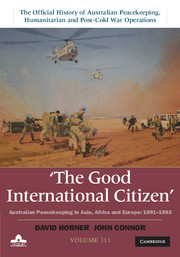Book contents
- Frontmatter
- Contents
- Maps
- Preface
- Chronology 1989–99
- Abbreviations
- Part 1 Strategy and policy
- 1 Peacekeeping after the Gulf War
- 2 Peacekeeping in the new world disorder
- Part 2 Cambodia
- Part 3 Western Sahara
- Part 4 Former Yugoslavia
- Part 5 Watch on Iraq
- Appendix A United Nations Security Council resolutions
- Appendix B Major office bearers, 1991–99
- Bibliography
- Index
- Plate section
- References
2 - Peacekeeping in the new world disorder
Australia's response, 1991–96
from Part 1 - Strategy and policy
Published online by Cambridge University Press: 12 May 2022
- Frontmatter
- Contents
- Maps
- Preface
- Chronology 1989–99
- Abbreviations
- Part 1 Strategy and policy
- 1 Peacekeeping after the Gulf War
- 2 Peacekeeping in the new world disorder
- Part 2 Cambodia
- Part 3 Western Sahara
- Part 4 Former Yugoslavia
- Part 5 Watch on Iraq
- Appendix A United Nations Security Council resolutions
- Appendix B Major office bearers, 1991–99
- Bibliography
- Index
- Plate section
- References
Summary
This chapter describes the Keating Government's approach to peacekeeping in the context of international affairs and Australian defence and foreign policy. During the life of this government, from December 1991 to March 1996, it further limited Australia's commitment to the former Yugoslavia, but decided to send troops to Somalia in 1992–93, to send police and military personnel to Mozambique in 1994, to provide military support to the peace process in Bougainville in 1994, to send a contingent to Rwanda in 1994–95 and to send police to Haiti in 1994–95. The stories of most of these latter missions will be told in subsequent volumes, but the general policy framework is described here as it affected decisions about the continuing management of Australia's involvement in maritime sanctions (Operation Damask), the elimination of Iraq's weapons of mass destruction (Unscom), Cambodia, Yugoslavia and Western Sahara, which continued well into the time of the Keating Government. Before looking at Australia's approach to peacekeeping under this government, however, we need briefly to outline the changes in international affairs during this period.
The New World Disorder
The year of 1992 began with high optimism that the United Nations would be able to play a major role in resolving conflicts around the world. At the beginning of the year Boutros Boutros-Ghali, a former Egyptian Deputy Foreign Minister, succeeded Javier Pérez de Cuéllar as UN Secretary-General. With the increasing number and complexity of UN peacekeeping operations, on 31 January the Security Council invited Boutros-Ghali to prepare an ‘analysis and recommendations on ways of strengthening and making more efficient within the framework and provisions of the Charter the capacity of the United Nations for preventive diplomacy, for peacemaking and for peace-keeping’. In response, on 17 June 1992 Boutros-Ghali delivered a report, An Agenda for Peace, which set out the different roles of peacekeeping-type operations and changed the lexicon of peacekeeping. He defined the terms ‘preventive diplomacy’, ‘peacemaking’, ‘peacekeeping’ and ‘post-conflict peace-building’. Among many recommendations, he suggested that member states make armed forces available ‘on a permanent basis’ for both peacekeeping and peace enforcement tasks.
- Type
- Chapter
- Information
- The Good International CitizenAustralian Peacekeeping in Asia, Africa and Europe 1991–1993, pp. 16 - 38Publisher: Cambridge University PressPrint publication year: 2014

